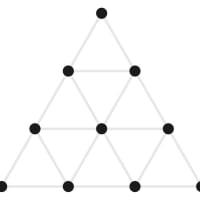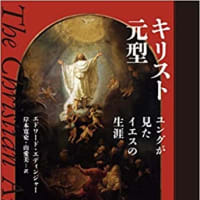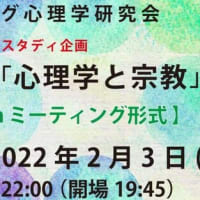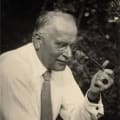
神に感謝します。私はユングであり、ユング人(派)ではありません
。「カール・ユング、ユング:伝記(ハンナ)、78ページ。
Thank God I'm Jung and not a
Jungian. “Carl Jung, Jung: A Biography (Hannah), Page 78.
A
ユングが「自分が "ユング派 "でなくてよかった」と言ったのは、多くの人が「独立」のプロセスを生きて体現していなかったからではないでしょうか。彼の弟子たちはそれを研究しましたが、自我は群れの中であまりにも強力に確立されています。
"神に感謝、私はユングであって、ユング派ではない。" ~カール・ユング『ユング。A Biography [Hannah], Page 78.
あるインタビューでMLvFは、ユングが自分の教え子たちが「理解」しないことにどれほど苛立っていたかを語っています。ユングは「私が育てた弟子たちの中で、彼らはまだ幼稚園児だ...」と言っていました。つまり、彼らはまだマス男の世界観を持っていたのです。
"私は神学者や自分のギルド(心理学者)にはあまり人気がありません。それは驚くべきことであり、驚くべきことではない」。~C.G.ユング、ダヴィッド神父への手紙、1961年2月11日
彼は自分の思想が同時代の人々に期待しすぎていることを知っていたからだ。~アニエラ・ジャッフェ著「ユングの晩年」124ページ。
"考えることは難しい、だから群れに判断を委ねるのだ!" ~CGユング、CW10、パラ652。
A
I would suggest that the reason Jung remarked that he was glad he was not a “Jungian” is because so many were not living and embodying the process of Individuation. His students studied it but the ego is too powerfully established in the Herd.
“Thank God, I’m Jung, and not a Jungian.” ~Carl Jung, Jung: A Biography [Hannah], Page 78.
In an interview MLvF spoke of how exasperated Jung was about his pupils who didn’t ‘get it’. Jung would say; “of all those pupils I’ve trained and they are still just kindergarten…” (in other words, they still held Mass-man worldview.)
"I am not very popular with theologians or my own guild [psychologists]. It is astonishing & not astonishing." ~C.G. Jung, Letter to Fr. David, 11 Feb 1961
But at bottom he understood and accepted his "outsiderness", because he knew that his ideas expected too much of his contemporaries. ~Aniela Jaffe, Jung’s Last Years, Page 124.
“Thinking is difficult, therefore let the herd pronounce judgment!” ~CG Jung, CW 10, Para 652.
A
"私は何度も自分に問いかけました。なぜこの時代に、少なくとも私が取り組んでいることを理解できる人がいないのだろうかと。それは、私の単なる虚栄心や承認欲求ではなく、同胞に対する純粋な関心だと思います。それはおそらく、薬師の部族に対する古代からの機能的な関係であり、参加の神秘性であり、医師のエートスの本質なのです。
この問題が微妙であるように、その解決には心の繊細さと心の機能の実際の経験が必要である。60年も現場で働いていれば、自分の仕事について多少なりとも知っているはずである。しかし、最も無能なバカでもよく知っていて、私は何の励ましも受けませんでした。それどころか、誤解されたり、まったく無視されたりすることもあった。このような状況では、理解されないような考察を加えて意見の混乱を大きくするのが怖くなったのです。
~CGユング『手紙』第2巻、p.589。
A
“I asked myself time and again why there are no men in our epoch who could see at least what I was wrestling with. I think it is not mere vanity and desire for recognition on my part, but a genuine concern for my fellow-beings. It is presumably the ancient functional relationship of the medicine-man to his tribe, the participation mystique and the essence of the physician’s ethos.
As the problem is subtle, its solution demands subtlety of mind and real experience of the mind’s functioning. After 60 solid years of field-work I may be supposed to know at least something about my job. But even the most incompetent ass knew better and I received no encouragement. On the contrary I was misunderstood or completely ignored. Under those circumstances I even grew afraid to increase the chaos of opinion by adding considerations which could not be understood.”
~CG Jung, Letters, Vol. 2, p. 589.
A
ヘンリー・コービンのユングについての記述:
"著者は一人で、自分の魂の力だけで強くなっている。現代において、このようなケースはすでに並外れたものであり、特別な尊敬を必要とします。彼はいかなる宗教、教義、組織のスポークスマンでもありません。そのような人の信用を失墜させることを目的とした裏切りのある小さな表現があります。"そのような人は自分自身だけを代表している" それに対して、この場合の意味は、まさにすべての壮大さ、すべての力、すべての信憑性を伝えるものです。集団的な規範や公式のドグマ、既成の意見を代表しているだけなのに、自分自身の「代表」であると主張できる人が、今日どれだけいるでしょうか。この男一人の存在があるからこそ、私は、もし本当に一人であるならば、一人で(彼の著作を)熟考し、このメッセージに耳を傾けるよう、すべての一人の人を招待したいのです。本物の全体性は、孤独から、そして孤独の中でなければ、ここでは生まれません。ここにある「神学」は、マニュアルやテキストの歴史的な批判を通して学ぶものではなく、魂の夜と苦しみの中で、妥協することなく、臆病になることなく、放棄することなく、内的に従事する聖なる闘争の中で学ぶものなのです。
[コービンは、心理学とは、ユングは常にヒエロジー、つまり「神聖な事柄の科学」を意味していると述べています]。
A
"ユングの人生を歩めば歩むほど、彼についていくのは難しくなります。大多数の人は1912年までは追いかけることができますが、タイプが出てきた1920年まで追いかけることができる人はもっと少なく、それ以降は非常に難しくなり、1950年以降はほとんどの人が忘れてしまいます...しかし、私はそれを紹介しようとしているのです" 。~エドワード・エジンガー「個人化」。エドワード・エディンガー、"Individuation: A Myth for Modern Man" you-tube video、レクチャー。
A
私は、自分が求めているものを人々に見てもらうことができないことを理解しなければなりませんでした。私は実質的に一人です。
あれこれと理解してくれる人は数人いますが、全体を見ている人はほとんどいません。....
人間には魂があり、その分野には埋もれた宝があるという事実に人々の目を開かせること、そして我々の宗教や哲学が嘆かわしい状態にあるという事実に、私は最も重要な任務を果たせなかった。~ユングは、ゲルハルト・アドラーが引用した「ユングの人格の諸相」(『心理学の展望』6/1(1975年春)、14ページ)に登場しています。
"私は神学者や自分のギルド(心理学者)にはあまり人気がありません。それは驚くべきことであり、驚くべきことではない。" ~C.G.ユング、ダヴィッド神父への手紙、1961年2月11日
彼は自分の思想が同時代の人々に期待しすぎていることを知っていたからだ。~アニエラ・ジャッフェ著「ユングの晩年」124ページ。
"もし私が批判に耐えられなかったら、とっくに死んでいたでしょう。~ カール・G・ユング「書簡集第二巻、583・584ページ」"
A
"ユングの質問は、私たち全員につきまとっています--この人はどんな仕事を避けているのか?ほとんどの場合、私たちは自分の人生に対する責任を回避しているのです。" ~ジェームス・ホリス
多くの人が自己認識と反省が必要であることを認めますが、そのような必要性が自分自身を拘束するものであると考える人はほとんどいません。~カール・ユング『手紙』第二巻465-466ページ
"内面の経験や人格の核に手を伸ばそうとすると、ほとんどの人は逃げ出してしまう...。
内的体験のリスク、つまり精神の冒険は、いずれにしてもほとんどの人間にとっては異質なものです。そのような経験が心霊的なリアリティを持つかもしれないという可能性は、彼らにとって悩みの種なのです。" ~ カール・ユング『141、記憶、夢、反省』より
人は自分の魂と向き合うことを避けるために、どんなに不条理なことでも何でもします。インドのヨガやそのエクササイズを実践したり、厳しい食生活を送ったり、神智学を暗記したり、世界中の文献から神秘的な文章を機械的に繰り返し読んだりするのは、すべて自分自身と折り合いをつけることができず、自分の魂から何か有用なものが出てくるとは微塵も信じていないからだ。このようにして、魂は何も良いものが出てこないナザレのような状態になってしまったのです。だからこそ、私たちは地球の四隅からそれを手に入れよう。それがより奇想天外で奇妙なものであればあるほどいい。~カール・ユング『心理学と錬金術』99ページ。
私のために立ち上がってくれる勇気のある人は、ほとんどいない。~カール・ユング『手紙』第2巻、217ページ。
A
Henry Corbin’s description of Jung :
“The author is alone, strong with the force of his soul alone. In our times, such a case is already extraordinary and calls for a singular respect. He is not the spokesman of any religious faith, any dogma, or any institution. There is a treacherous little expression that is intended to ruin the credibility of the person at whom it is targeted: “Such a person represents only himself.” In contrast, the meaning here in this case would be precisely what conveys all the grandeur, all the force, and all the authenticity. For how many men today could claim really to be “representatives” of themselves, when they represent only collective norms, official dogmas, and ready-made opinions? It is because we are in the presence here of this man alone that I would like to invite all those alone to contemplate [his writings], to listen to this message, if really they are alone. The authentic totality cannot be born here except from the solitudes and in solitude. The ‘theology’ we have here is not learned in manuals or through the historical critique of texts, but in the night and the suffering of the soul, in the sacred struggle that is engaged innerly without compromise, without cowardice, and without abdication.”
[by psychology, Corbin goes on, Jung really always means hierology , “the science of sacred matters”.]
A
“The further along in Jung’s life you go the harder it is to follow him. The vast majority of people can follow him up to 1912, a smaller number can follow him up to 1920 when types came out, after that it gets very difficult, after 1950 for most people forget it… but that’s what I’m going to try to introduce you to.” ~Edward Edinger, "Individuation: A Myth for Modern Man" you-tube video, Lecture.
A
I had to understand that I was unable to make the people see what I am after. I am practically alone.
There are a few who understand this and that, but almost nobody sees the whole....
I have failed in my foremost task: to open people’s eyes to the fact that man has a soul and there is a buried treasure in the field and that our religion and philosophy are in a lamentable state. ~Jung, quoted by Gerhard Adler in “Aspects of Jung’s Personality,” in Psychological Perspectives 6/1 (Spring 1975), p. 14.
"I am not very popular with theologians or my own guild [psychologists]. It is astonishing & not astonishing." ~C.G. Jung, Letter to Fr. David, 11 Feb 1961
But at bottom he understood and accepted his "outsiderness", because he knew that his ideas expected too much of his contemporaries. ~Aniela Jaffe, Jung’s Last Years, Page 124.
"If I could not stand criticism I would have been dead long ago, since I have had nothing but criticism for 60 years." ~ Carl G. Jung, " Letters Vol II, Pages 583 & 584."
A
"Jung's question haunts us all--what task is this person avoiding? In most cases, we are avoiding responsibility for our lives." ~James Hollis
A good many will admit that self-knowledge and reflection are needed, but very few indeed will consider such necessities binding upon themselves. ~Carl Jung, Letters Vol. II, Pages 465-466
"Whenever there is a reaching down into the innermost experience, into the nucleus of personality, most people run away...
The risk of inner experience, the adventure of the Spirit, is in any case, alien to most human beings. The possibility that such an experience might have psychic reality is troubling to them." ~ Carl Jung, 141, Memories, Dreams, Reflections
People will do anything, no matter how absurd, in order to avoid facing their own souls. They will practice Indian yoga and all its exercises, observe a strict regimen of diet, learn theosophy by heart, or mechanically repeat mystic text from the literature of the whole world - all because they cannot get on with themselves and have not slightest faith that anything useful could ever come out of their own souls. Thus the soul has been turned into a Nazareth Gradually from which nothing good can come. Therefore let us fetch it from the four corners of the earth - the more far-fetched and bizarre it is the better. ~Carl Jung, Psychology and Alchemy, Page 99 .
There are damned few who have the guts to stand up for me. ~Carl Jung, Letters Vol. II, Page 217.






















